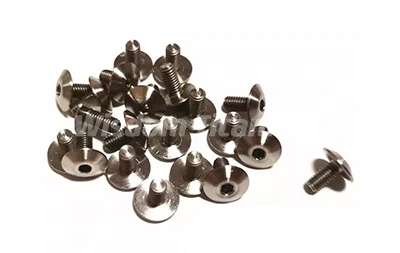
M3 titanium bolts are small, lightweight fasteners made from titanium alloy with a nominal thread diameter of 3 millimeters. These bolts are widely used in various industries due to their excellent strength-to-weight ratio, corrosion resistance, and biocompatibility. Understanding the available lengths of M3 titanium bolts is crucial for selecting the right fastener for your specific application.
The length of an M3 titanium bolt refers to the distance from the underside of the bolt head to the end of the threaded portion. This measurement is critical as it determines how much of the bolt can be used for fastening and how much thread engagement can be achieved. Proper bolt length selection ensures optimal performance, safety, and longevity of the assembled components.
Common lengths
M3 titanium bolts are available in a wide range of lengths to accommodate various applications and material thicknesses. The most common lengths typically range from 4mm to 30mm, though both shorter and longer options can be found for specialized uses. Here are some standard lengths you'll frequently encounter in the market:
- 4mm: These ultra-short M3 titanium bolts are often used in miniature electronics, optical devices, or very thin material applications where space is extremely limited. They may be used to secure small PCB components or in precision instruments.
- 6mm: A popular choice for securing thin components or in applications with minimal depth requirements. These bolts are commonly used in consumer electronics, such as smartphones or tablets, where internal space is at a premium.
- 8mm: Widely used in electronics enclosures, small mechanical assemblies, and lightweight structural applications. This length provides enough thread engagement for many common applications while maintaining a compact profile.
- 10mm: Suitable for slightly thicker materials or when additional thread engagement is needed. These bolts are often found in automotive electronics, drones, or other applications where vibration resistance is important.
- 12mm: Commonly used in medical devices, aerospace components, and other precision engineering applications. This length allows for good thread engagement in moderately thick materials.
- 16mm: Provides extra length for applications requiring deeper thread engagement or spanning thicker materials. Often used in aerospace structural components or high-load applications.
- 20mm: Used in more substantial assemblies or when joining multiple components. This length is common in larger electronic enclosures, robotics, or marine applications where corrosion resistance is crucial.
- 25mm and 30mm: These longer options are suitable for specialized applications requiring extended reach or thread engagement. They might be used in composite material assemblies, advanced aerospace structures, or custom machinery.
It's worth noting that while these are common lengths, manufacturers may offer additional sizes to meet specific industry or application needs. Custom lengths can also be produced for unique requirements, especially in high-precision or specialized industries.
Factors for choosing the right length
Selecting the appropriate length for an M3 titanium bolt is crucial for ensuring optimal performance, safety, and reliability in any application. Several factors need to be carefully considered when choosing the right length:
1. Material thickness: The combined thickness of all materials being joined is a primary consideration. The bolt should be long enough to pass through all layers while allowing for proper thread engagement. Measure the total grip length (the thickness of all materials to be fastened) accurately to determine the minimum required bolt length.
2. Thread engagement: Adequate thread engagement is essential for the bolt to develop its full strength. Generally, a minimum of 1 to 1.5 times the bolt diameter (3-4.5mm for M3 bolts) should be engaged in the threaded hole or nut. For critical applications or when working with softer materials, more thread engagement may be necessary.
3. Washer or spacer use: If washers, lock washers, or spacers are part of the assembly, their thickness must be accounted for in the overall length calculation. Remember to include these in your grip length measurement.
4. Clearance requirements: Consider any clearance needed on the non-threaded side of the joint, especially in applications where protruding bolt ends could interfere with other components or pose a safety hazard. In some cases, you may need to select a shorter bolt or consider countersinking the bolt head.
5. Load requirements: Higher loads may require longer bolts to increase thread engagement and distribute forces over a larger area. Consult engineering guidelines or perform calculations to determine the necessary thread engagement for your specific load conditions.
When selecting the appropriate length, it's generally advisable to choose a bolt that is slightly longer than the minimum required. This provides some tolerance for manufacturing variations and ensures adequate thread engagement. A good rule of thumb is to add 2-3mm to your calculated minimum length and choose the nearest standard size above this value.
For precise applications, it's recommended to calculate the exact required length based on the specific assembly details. This can be done by adding the grip length (total thickness of materials being joined), any washer thickness, and the desired thread engagement length. Then, select the nearest standard length that meets or slightly exceeds this calculated value.
In cases where standard lengths don't meet the exact requirements, custom-length M3 titanium bolts can be manufactured to suit specific needs. This is particularly common in aerospace, medical, and high-precision engineering applications where optimal fit and performance are critical.
M3 Titanium Bolt For Sale
Wisdom Titanium company accepts custom, Bolt sizes m1.6-m48, and bolt length can reach 345mm. If you are choosing your m3 titanium bolt manufacturers, welcome to contact us at sales@wisdomtitanium.com.
References
1. ASTM F136-13. (2013). Standard Specification for Wrought Titanium-6Aluminum-4Vanadium ELI (Extra Low Interstitial) Alloy for Surgical Implant Applications. ASTM International.
2. Budynas, R. G., & Nisbett, J. K. (2020). Shigley's Mechanical Engineering Design (11th ed.). McGraw-Hill Education.
3. Donachie, M. J. (2000). Titanium: A Technical Guide (2nd ed.). ASM International.
4. ISO 4017:2014. (2014). Fasteners — Hexagon head screws — Product grades A and B. International Organization for Standardization.
5. Kutz, M. (Ed.). (2002). Handbook of Materials Selection. John Wiley & Sons.





